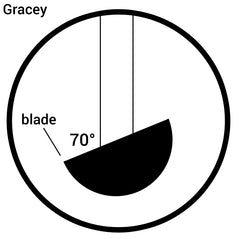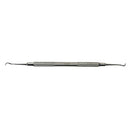Description
- Desc.
- Sharpening
Dull scalers and curettes are unable to thoroughly remove the calculus from the teeth, and instead, just glide across the surface of the tooth. Excess force is not only bad for the patient, but can contribute to serious hand, wrist, neck, shoulder, and back pain for the practitioner. Sharp instruments on the other hand save time, improve cutting ability, increase tactile sensitivity, reduce fatigue, and the list goes on…read more on our Dental Instrument Sharpening 101 blog post. To correctly sharpen scalers and curettes, it is important that you are able to identify them and their differences.
Scalers

Scalers have a sharp triangular tip and blades on both sides. Because scalers have the sharp triangular tip, they can cause damage to the gingiva and should not be used below the gum line (subgingivally).
Curettes:

Curettes are designed with a rounded tip and at least one edge that is not sharp for safely removing calculus subgingivally. They are also commonly used supragingivally due to the fact that they come in many shapes and angles designed for specific tooth surfaces and areas in the mouth. There are two types of curettes.
Universal Curettes:

Universal curettes have two sharp edges making them more “universal” and easier to use.
Gracey Curettes:
Gracey’s have only one sharp edge, leaving two dull edges that are safe against the soft tissue. This makes the Gracey less versatile, but more efficient at removing subgingival calculus.
Instrument Organization:
When purchasing new scalers and curettes it can be very helpful to use identification tape or rings (link to instrument id collection) to easily differentiate between scalers, and universal and gracey curettes. Instrument ID systems will not only save you time while sharpening, but also during your dental procedures.
Sharpening Tools:
Serona carries a number of different sharpening products, the most popular being our Serona Sharpening Kit which provides everything you need to start sharpening all of your dental instruments.
Sharpening Scalers & Curettes
Dull scalers and curettes are unable to thoroughly remove the calculus from the teeth, and instead, just glide across the surface of the tooth. Excess force is not only bad for the patient, but can contribute to serious hand, wrist, neck, shoulder, and back pain for the practitioner. Sharp instruments on the other hand save time, improve cutting ability, increase tactile sensitivity, reduce fatigue, and the list goes on…read more on our Dental Instrument Sharpening 101 blog post. To correctly sharpen scalers and curettes, it is important that you are able to identify them and their differences.
Scalers

Scalers have a sharp triangular tip and blades on both sides. Because scalers have the sharp triangular tip, they can cause damage to the gingiva and should not be used below the gum line (subgingivally).
Curettes:

Curettes are designed with a rounded tip and at least one edge that is not sharp for safely removing calculus subgingivally. They are also commonly used supragingivally due to the fact that they come in many shapes and angles designed for specific tooth surfaces and areas in the mouth. There are two types of curettes.
Universal Curettes:

Universal curettes have two sharp edges making them more “universal” and easier to use.
Gracey Curettes:
Gracey’s have only one sharp edge, leaving two dull edges that are safe against the soft tissue. This makes the Gracey less versatile, but more efficient at removing subgingival calculus.
Instrument Organization:
When purchasing new scalers and curettes it can be very helpful to use identification tape or rings (link to instrument id collection) to easily differentiate between scalers, and universal and gracey curettes. Instrument ID systems will not only save you time while sharpening, but also during your dental procedures.
Sharpening Tools:
Serona carries a number of different sharpening products, the most popular being our Serona Sharpening Kit which provides everything you need to start sharpening all of your dental instruments.


